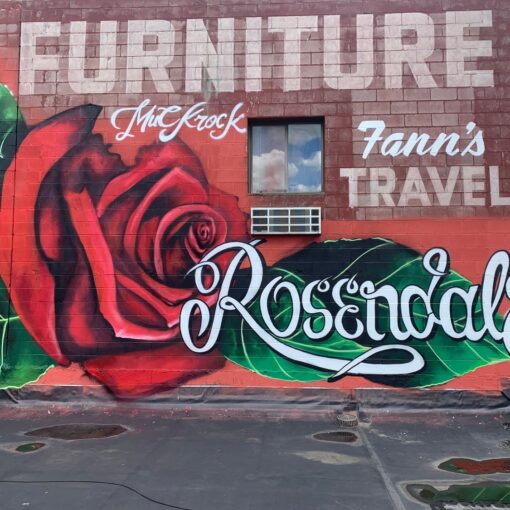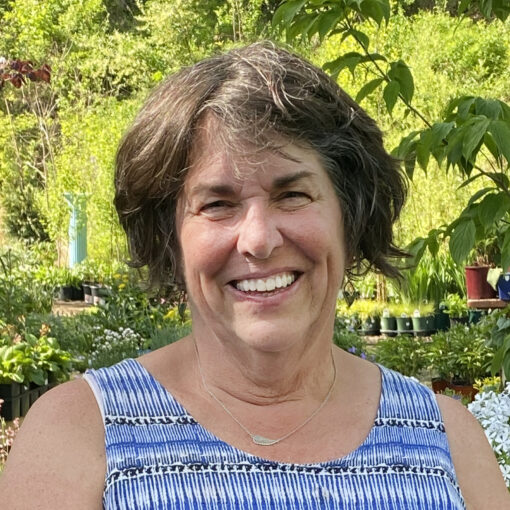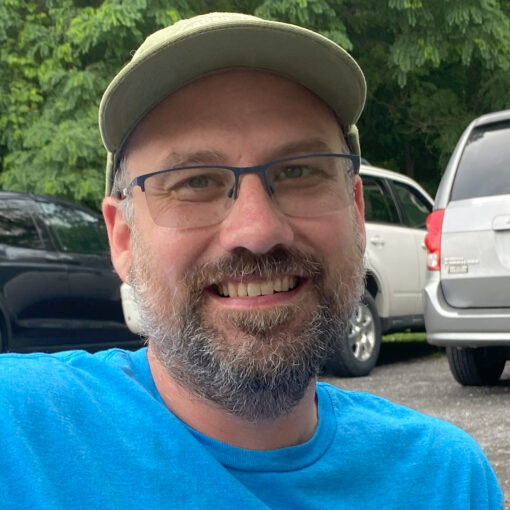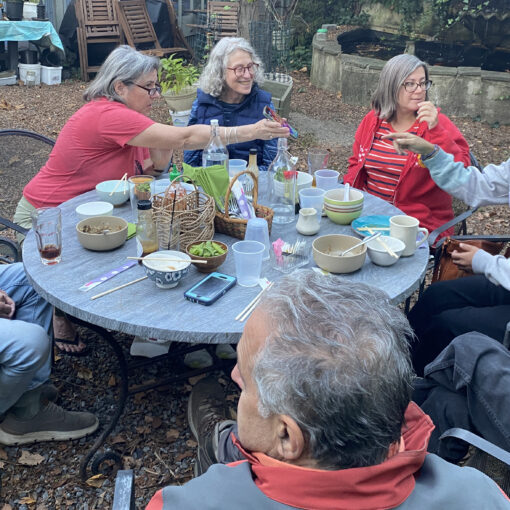Jan 6, 2025 Board President Fre Atlast (F), Amanda (Am), Maria (Ma), Andy (An), Maura (Mu), Sianna (S), Chris (C), John (J), Bill (B), Michael (Mi)
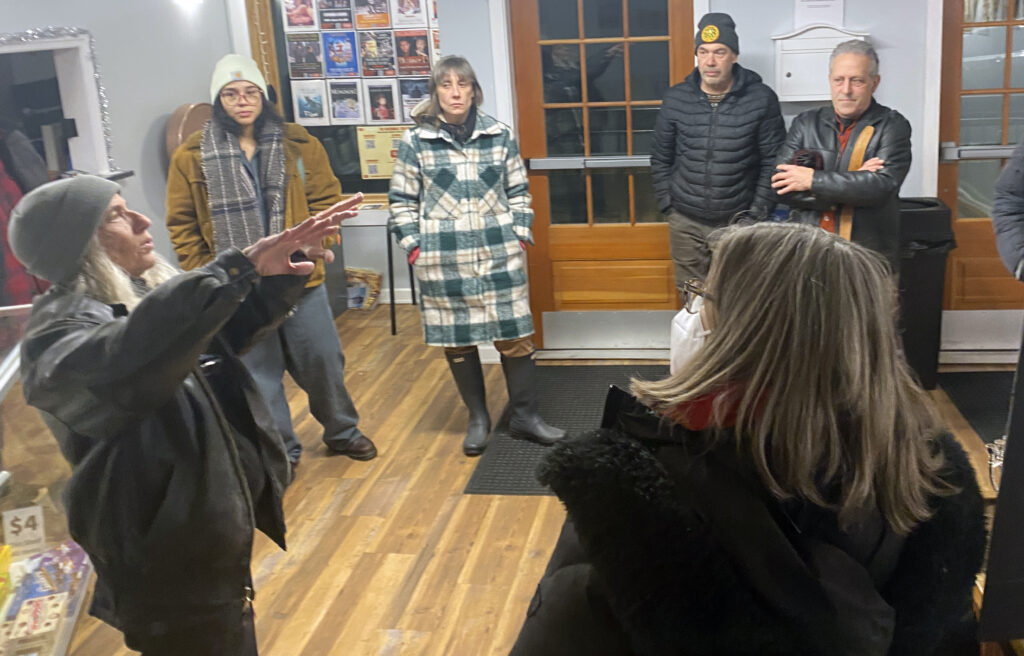
Fre: It would take Uncle Tony like five hours to prepare a film before it was shown. Because it comes in a bunch of reels and he’d transfer them onto the big projector wheels, but he’d splice together, he’d add the trailers onto it and he would check it. And it’s all film that you have to cut. He made sure there was no damage because the film comes here and then it gets shipped to another theater. And so films get damaged all the time. He was always splicing any little damaged piece of film. He was very conscientious about it. In fact, Michael requested his splicing machine – he’s making a little altar for Uncle Tony. It would take Tony hours and hours.This was basically his life, this theater.
(Q) Where did he learn about it?
F: I think his father. It was like a family. Yeah, but they kind of learned on the fly together. They were tile workers by day. The only remnant of their tile worker in the old lady’s bathroom.
That’s it. The bathroom had these horrific pink tiles and whatever they had left over. And you can see their tile work on the floor of that bathroom, too. That’s what they did by day and then they come and show films at night.
For our volunteer appreciation, we’re going to show a film called “The Movie House on Main Street”. It’s a 40-minute film made by a young filmmaker. Extensively goes into Uncle Tony’s practice and routine. It’s a beautiful film by Teresa Torciano. There’s been about five or six different films made about the theater.
Ma: The Saga of the Theater. We’re still standing.
F: Believe me, you know, there’s only one movie theater left in the Bronx. I read this article the other day. They’re all closing. Same with Brooklyn.
An: So we’re lucky. We have three great theaters within what? 15 miles.
Ma: Since this is a Heart & Soul meeting, and we love to hear what people have to say about things, and we’re in the theater … I was wondering if we could pass my phone around. This is our high tech interview recording device. Just each say what they like, what they love about the Rosendale Theater, if they do.
Mu: My first name is Maura. I think what I appreciate is being able to see older movies. I’m not always wanting to see the latest movies, but like to catch up on some actors or directors that I’m not so knowledgeable of their filmography. It’s nice to be able to see different roles, different, different movies than just what the latest thing is out, out in theaters. So it’s more of like an alternative artistic opportunity to be a viewer.
Sianna: And since this is my first time, I guess I could just say I’m grateful for the opportunity to be here and behind the scenes. I like to see how things function, but I didn’t know I could walk into some doors and be able to be curious the way I’m curious. I don’t have a strong background in art or film or any of that, but it’s never too late.
F: Open that door. And I’m very grateful to be here.
Bill: Yeah, this is a rare gem. I mean, just that we have it and that the collectives saved it, rescued it from some other fate. Once you have something like this, never let it go. As far as urban planning, what’s ideal in a small town, it’s a crowning jewel. That and Joppenburgh Mountain. Things like that. Assets like that. But I mean, and the fact that it’s homemade and Rosendale is handicrafted. You know, it’s built environment, but its culture is completely like never going to be mainstream, not even close. They’re not interested in us and we’re not interested in them. So things have to be conceived out of our own imaginations. And we’re free to do that here. And the Rosendale theater, you know, facilitates that, invites that. Makes it happen.
F: The theater is its own entity. It’s beyond any of us. And it has a life of its own. There will always be drama here because of the theater. There will always be excitement. And I think no matter what happens with the film industry itself, I think people need to share artistic experiences, whether that be film, which is a form of storytelling or music or art. It’s one thing to do it in your living room. But there is something that is so important about the community having a shared experience together.
[about popcorn]
Crunch, crunch, crunch.
It’s the best.
Andy: I think Rosendale theater is just magic. It’s one of those things that is unexpected. But once I realized that it was such a part of the fabric of Rosendale, I understood that it was magic made by people into something that was real. And it’s fun to come here. It’s fun to know that it’s a community-owned theater. And it’s so gratifying to pay a little bit extra every year to be a member, and then pay again when you come here, knowing that the money is not going to some big corporate conglomerate, but it’s going back into the theater we like.
Mu: My parents are both from New York City and my mom’s from the Bronx, my dad’s from Brooklyn, and they grew up going to all types of different theaters along the way. We had owned a house in New Paltz and when the theater was purchased by [a new] owner, I remember “Bowling for Columbine” came out and they wouldn’t screen it. And that was kind of the end for us going to that theater. For my mom, especially.
F: There was a line down the block when we showed [Bowling for Colombine].
Michael: First of all, I had no idea what I was getting into here. I knew there was a lot of history with this building in that. I was a weekender for five years and full time for the last five years. And I just got a sense that this seemed to be the center of the whole kind of Ulster County area or whatever, where things happen, where people get together. We’re members. I remember one thing I saw here -“A Quiet Place.” And in that [horror] movie, it had a New York newspaper floating around. When we got out, somebody was pointing to the trestle and said, oh, that’s where the monster was. They actually filmed it half a mile from here. It was amazing. I had no idea of that. But just the sense of this history and hearing all the people that made it and just amazing technology and I’m glad that they were able to keep this going. It’s still thriving, it seems to me.
F: You know, because when we signed on the dotted line and we got possession of the building, we had been nine months of fundraising focused. We didn’t know anything about running a theatre. So we closed at four o’clock and we had to be at the theatre to open by six. So thank God for Uncle Tony. He was the only one who knew how anything operated. We didn’t know, you know, I mean, we knew how to turn on the lights. But, you know, because we had been studying with Michael for months before the purchase went through and we were kind of co-producing with him.
An: What was the first film you showed? That opening night.
Fre: I want to say, gosh, I can’t remember. “Blood on the Moon” was a western that they showed the first night.
Chris: What I love about the Rosendale Theatre -. I think the fact that you can attend a movie, [as a] volunteer, you come down to town, you see what’s going on, you see some people, you see who’s showing up for, you canoodle a little bit, you see the movie, then after the movie, people congregate and talk about it. I think that that’s worth a million dollars. You can’t do that up in Kingston. I think it’s so critical to the community. It’s a pretty sure thing. You show up, you’re going to meet somebody, you’re going to have some stimulating thoughts. You can’t put a price on that, it’s just a great experience.
Also, over the years, I’ve met a lot of new Ulster County residents, new Rosendale residents, and it’s like, “come to the theatre!” You want to integrate into the community, you want to meet: “come to the theatre!” volunteer. It’s the Ellis Island of Ulster County. It’s a pretty cool thing.
F: The thing is, you want to get married , you can get married here. We’ve had weddings here, yeah, for sure. You want to have a memorial here. You need to raise money because someone’s house burned down. They don’t do that at the cineplex. That’s not part of it. This is an institution that really anchors community building and community health.
Mu: And learning. That’s why I asked about the film selection, because I just finished Tarantino’s latest book. And I jotted down a list of what I need to see based on his recommendations. Boom, boom, boom! A bunch of films from my list wound up here and I wouldn’t have otherwise known about that had I not read the book, but then it was offered here, which is like food, educational food, film food.
F: Yeah, we have a great programming committee, but anyone is welcome anytime to come in and say, I have this film or I have this idea or I would like to see. And we would work with them to make it happen. They have to step up and produce. We can’t produce every person’s ideas because there’s far more ideas than there are people in time to produce them.
Ma: I love it for all the reasons you all have said. Another thing that I love about it is when you have Q&A after the films with people that have something to do with the films. I think that Rosendale benefits from its proximity to the city. And they make use of that because I’ve seen so many fascinating people talking about their roles in films here. It’s fantastic.
F: Yeah, that’s what we call added value programming. And we find that that is really helpful in getting people to come out to see a film. We have some kind of added value, musical component, speakers. And this area is so rich with artists, actors, writers, directors that you can tap a lot of, really, people that are connected in the film.
Ma: You all do a good job of it. And the science series, the science film series had good panels afterwards. It’s great.
F: Yeah, that was Pam ran that and that was through “science on film” grants. So, yeah, different people, they have different projects that they want to see. And so they take that on. She did all the grant work. She did, you know, [the film] Fantastic Fungi. You know, all of that.
Ma: So next round is a story that you think personifies the Rosendale theater and why.
Amanda: A year or two ago, I saw a film here about the life of Wangari Matai, the Kenyan leader, the woman leader. And I just was curious and I had, it was so informative and the crowd was amazing and we had drumming and dancing. I can’t remember before or after in the aisles and the film was just so uplifting and beautiful and sort of a documentary. And I had never even knew who she was beforehand and I came out with this sort of totally new information, new perspective about this amazing person. So I think the theater really introduces people to just completely new ideas.
You know, completely like I went to see the Muppets the other day and then Fiddler on the Roof and you know, the crowds were wonderful. And then you also get these more serious films, but that one I just remember, it stood out to me as being just so informative. Like, I love documentaries, but yeah, seeing it with a friendly and engaged crowd, like the movies at this theater really makes a difference.
Sianna: I’ll probably tell this evening’s story in the future.
John: I have a lot of memories, great memories of things at the theater, live events and films and performing here even. But a film maybe five years ago that really was perfect for the theater was this black and white film called Lighthouse, which is just like two characters in a Lighthouse. Like really dark, gothic, harrowing film to bear through. But the theater environment was perfect, like the old building. And then, you know, afterward we hung out at the Rosendale Cafe and you know, a group of us talked about it because it was so moving, but just the right space for a lot of movies.
F: Well, I have so many memories of just incredible programs, the men’s beauty pageant. Oh my God, oh my God. That was so insane. Like, I would get calls like, “can I bring a live chicken on stage?” No, you cannot bring a live chicken on stage. I banned the chicken and he came out with a little cock-a-doodle. But, and the gong shows too, those were really, I’ve never laughed so hard with the Felicia’s Marilyn Monroe and was it Carrie a ZsaZhsa? Oh my God, those two were the judges. Anyway, it was very, very funny.
I did a lot of live Foley sound effects work for live shows. And one of my favorites was an Alfred Hitchcock and it was the story of these two classical piano composers. One was Russian and the other was a Spaniard. And they kept sabotaging each other. And at one point I had to create the sound effects for him blowing up a piano. So I had a funky old bass guitar in a bucket and threw it in with all this reverb and stuff. And the actor was playing both parts. And so he’s finally there in jail. And he’s arguing with Spanish. It was just one of the wildest shows. But I love doing, “It’s a Wonderful Life”. It was a great show, making the water, the mess we would make. We had so much fun doing all the sound effects. Those were some of my favorite shows that we did.
Another thing is because we have to think out of the box, because we’re not first run, we have to be innovative. We have to constantly be creative. There’s at least 10 to 12 people that sit on the programming committee. And really, we really go through what’s going to work and what’s not. And we’re always coming up with new and innovative stuff. And then we’ll see it manifest in this theater and that theater.
So in that sense, I feel like the Rosendale Theater is the vanguard in this area to show other theaters. How they are going to be able to survive in this time when the industry is just so depleted and devastated.
An: So I think I share this story with a lot of people. During COVID, we obviously watched a lot of movies. I mean, that was almost every night we’d watch movies because that’s what we did. And then one day, we heard that the theater was going to be open and they were going to have a special, you’d wear masks and you had to sit, they had set it up so you were four seats away from anybody else, but you could sit with your significant other. And it was such a big event to be able to come to the theater and watch a movie with people,with other people, even though we had to do social distancing. So that was like the grand reopening. It was something that was so special came back into our lives.
Michael: A couple things I think about with this place. One is the Rosendale Street Fair in the summer – And it seems to be centered around this theater. In fact, if it’s hot or raining, you just plop yourself in there and you get the absolute best bands one after another.You feel kind of like a slob, just sitting there watching one thing after another. Another thing I remember is the mushroom festival. So the cooking and panels of the legality of psilocybin. I bought some spores here. It’s legal, yeah. Spores are. And my name is not Michael. But I mean, you think of this as mostly a movie theater and stuff, but it’s the center of all these other kinds of activities going around, live performances and demonstrations and legal.
John: I have a lot of memories from attending shows, performing lots of capacities,but I believe I volunteered the last movie before they closed. [for COVID] So it actually was pretty stark, like the cessation of that, having that. I didn’t even realize, but it was like, “that’s it.” And I think it was very stark.
I have another story that maybe is not so relevant, but it sticks in my mind. Our band, Dog On Fleas, performed here maybe six, seven, eight years ago. And I think it was sort of a CD release party. And we’ve performed here quite a few times. And this one particular time, we had a stereo digital recorder, about the size of a Walkman, that you could just press record and sit it anywhere. Then you ran a tape. And so we put it in the back of the theater at the top of the wall there, and then we performed. And it was really funny because it very clearly picked up all the commentaries. It was just hilarious because our shows, some parts of it are pretty tight.
A lot of it is improvised. It’s funny. And the commentary was absolutely hilarious. And especially like, you know, there might have been some moments when we were really winging it, And of course, you know, it’s a live show. I think it was one song that we were looking for cue or deciding whether we’re going to keep going or whatever. “They don’t even know when to stop!” And he’s like, Mr. Moms or something back there. They couldn’t believe it. That we were just winging it. “Can you believe it?” And it was just hilarious.
Ma: I love coming to this theater because I lived in Manhattan for 25 years, and there’s all this anxiety about going to the movies because they could be sold out. And “don’t go on the weekend!” – you’re going to stand online for an hour. But that’s never ever a problem here, which I love.
My story is also about mushrooms. When I heard about the movie Fantastic Fungi, it was not released yet. It wasn’t even on the radar yet. But the producers lived down the street from me in Accord. And I thought: I’m getting that movie for the theater. Luckily I knew Pam (on the Programming Committee], and I hooked Pam up with them. And we actually got to run it first. I’m excited to come, and I’m getting here ten minutes early and there is a line down the block, and they’re sold out. I’m thinking “f#@k” – I’m seeing this movie. I went around to the back door and I snuck in. Dina F. had the very last empty seat that she was saving for somebody who didn’t show up. And she gave it to me.
Here’s the moral of the story. Rosendale Theatre could sell out a documentary movie about fungus that nobody had even seen yet. With lines down the block. That was amazing.
F: We sold out from Muppets last week. The Muppets sold out. And I was like with the flashlight. Is that’s your ticket? one more? I’m all in. But until the machine wouldn’t let me sell anymore.
It was incredible because the line for concessions. We were all standing there like “the movie starting! The movie starting!” It was the first couple of minutes because I was getting popcorn. Because there was a line of thirty people in front of me. I got there fifteen minutes early which normally is not a problem. But it was. We sold 84 cups of popcorn I think. No, more than that.
(?): How many seats are there?
F: Now there’s 217. We pulled a couple of seats so that a wheelchair could go in and someone could sit next to them. So those are a few scattered around in the main auditorium.
Ma: Can we do one more round? What do you wish for the Rosendale Theatre? Ideas that you might have?
Mu: Because of my work schedule I can never go to the movies. And I desperately want to see the Jimi Hendrix one and the Cincinnati Kid this week and can’t. So if there were maybe multiple screenings of certain things or different days, like a Monday and Tuesday, those are my days off. But yeah, running things a couple times. Because I do feel like there’s some that I really want to see and I miss.
Am: I guess what I really want is for the Rosendale Theatre to stay open, you know, forever. And, you know, I don’t know how you guys do it. I’m sure it’s on a shoestring. But I think are you guys in the middle of a campaign right now, like a fundraising campaign?
F: Well, I think we’ve gotten everything covered for the siding. So I think we’re in good shape on that front. We can always use, you know, more donations. And like I say, we’re really trying to get businesses to sponsor the classic film series or the creature features or, you know.
Fre: The thing is, you know, we don’t know down the pike how much New York’s arts funding is going to get cut by the feds. And we depend a lot on the New York State Council on the Arts to fund us. We get a certain amount that goes towards the salaries of our staff. And, you know, we just don’t know what’s ahead. So, you know, come to the theatre. Yeah, come to the theatre.
Am: That’s the best way to keep it going, right, to have audience.
F: Yeah, you know, like our Sunday Silent, there’s live accompaniment. But Georgina, she goes out and she gets, I think it’s Fred D’Amaco, Insurance Guy. He sponsors her whole series for the year. And come to the volunteer gathering and, you know, there’s all different kinds of ways you can participate in volunteering. You know, so we just try to match people’s skills and desires and time.
S: For more sold out shows and for people to keep coming here and walking through the door.
J: I just want to see it continue and I intend to dedicate myself to the theatre more fully than I have.
An: We’re going to keep coming as long as we can get out of the house and get here somehow. And what was the most fun, we brought our grandkids here and they just thought it was amazing to go to this theatre. And so hopefully they’ll come visit more and we’ll go to the theatre more with them.
F: We will do more kids programming. That’s what we like about this.
Am: One thing I’d like to see is movies and then have someone behind the scenes. Question and answer afterwards.
F: Well, you know, you’re welcome to connect with programming committee. They meet the first Monday of the month.
Ma: I had a friend who was in Daughters of the Dust and we brought that picture here and she did Q&A afterwards. She came up from the city.
An: I love the idea of doing Hudson River, Hudson Valley, New York and stuff.I think that’s something I need to pay attention to. I like when John Bauermeister did the Hudson River.
Ma: Well, the new Rosendale horror movie.
F: I think it’s already scheduled. I think they contacted us. And said, we made this film. We’d like to show it at the theatre. You know, we used to have a lot of Hudsy shows here. Hudsy is a Kingston organization. And, you know, getting local filmmakers is really a great, great way to bring people into.
An: And we’re still part of the Woodstock Film Festival, right?
F: Yeah, you know, Hudsy is doing a lot of work in conjunction with Radio Kingston. All the events they do, they’re generally filming that stuff.
C: I’d love to see the theater continue to exist, but also to really successfully branch out like you’ve been and becoming a multi-use venue because the live, you know, all kinds of things are, I think, great. But also, I always have really enjoyed guest speakers and Q&A afterwards. And I’d bet you, like, if the word was put out to volunteers and then even, like, new city people who have maybe come get involved and are volunteers, I’d bet a surprising number of people….
F: I’m thinking how could we, like, relay that information? As, like, not like our calendar of what’s coming up in the month, but, hey, this is what we’re looking at in the next few months and list what we’re looking at and see if are there any other…
C: Yeah, I mean, people love Q&A with somebody involved. And I also think that the Rosendale Theater has a little bit of cachet with directors, like, you know, whoever. So, you can feel like, oh, yeah, I heard of that place. Yeah, I’ll come up from the city and talk about my film. You know, Jim Jarmusch, he’s been here a bunch of times.
F: And then you just don’t know. So, um, yeah, I’ll bring that back to everybody and say, you know, how can we tap more of the talent that is in our community to partner?
Ma: My idea: a talent night. It’s different from open mic. And you got to have the hook. You know, so people don’t have to sit through a horrible …
Fre: We had a sweeper or like the Apollo. Tony was the sweeper. Carl Welden was the dog. He had his daughter’s little, like, tights over his head. So it looked like a long-eared dog.
Ma: You could do themed talent, talent shows. I think people around here could come up with hilarious stuff.
F: Yeah, we can, you know, sure. We can do it. We need a producer, someone who can take charge and run it. And, you know, with the help of, you know. I’m trying to get Gus Mancini to come down and do a jazz funk kind of revolving players because he hand picks and, you know, have different guitars come in, come out. So, but he won’t travel until March.He doesn’t really like to travel in the winter. But that’s, that’s different than, like, a talent show.
Ma: Anybody have any last words that they’d like to share before I turn this off?
F: Thank you all for listening. I know really good to talk about all this. And it is a project close to my heart.
S: I want to mention something about learning and, like, I’m going to learn more about everything. I’m like, I’m in the stage of my life where I’m just curious about everything. So if I’d love to, now knowing how welcoming everyone is, not that I didn’t know, but just now knowing that I feel comfortable, I know that I would absorb and more stuff like this. But I’m sure there’s a lot of people that would love to learn that story that you told about Uncle Tony, like stretching out, like looking for all of, like any, I don’t know even how to picture that. But that, I’m sure people would think about, like, a workshop or something or wanting to.
Ma: Do the schools come here?
F: The biggest thing for schools is transportation. So if they can get a grant or we can get a grant to transport the kids. Well, the Muppets was a real awakening for me because the, the population has really changed in Rosendale and the surrounding area. A lot of young families. And so they’re, there’s a real need for things to do on a Saturday morning when the kids are awake and you want to just grab the kids.
S: I’m sure parents would want their kids to learn about even the history and I don’t know. I learned so much today. I have so much to Google. I would come back just to even see some,
Am: I’m sure they’d love to have you volunteer too. The library is really great here too.

